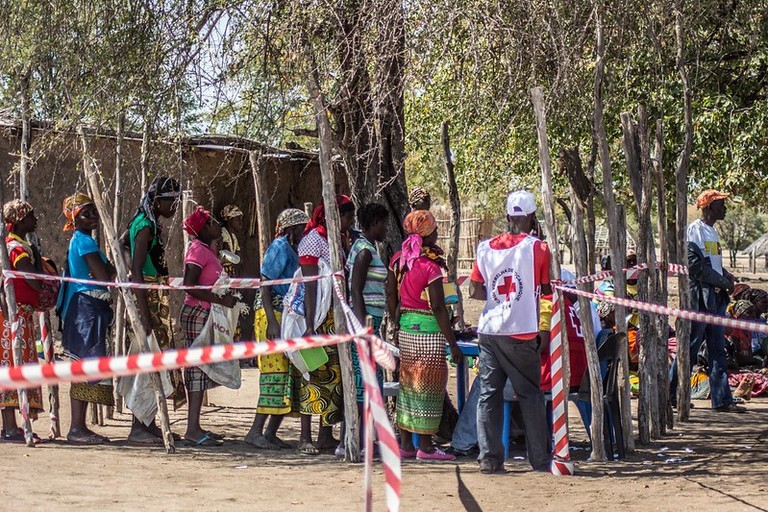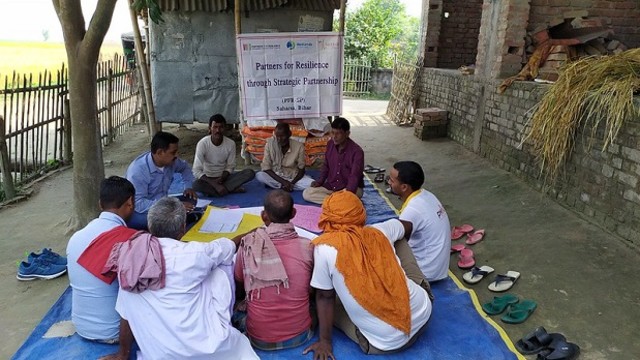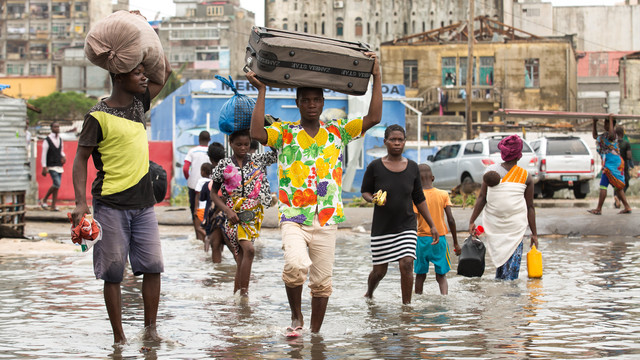Connecting humanitarians and climate change
IIED worked with Start Network – a global network of over 50 humanitarian agencies from five continents – to understand how humanitarian actors can tackle climate change more effectively.

Red Cross food distribution in Mabalane district, Mozambique, after the community has been severely impacted by severe drought (Photo: Aurélie Marrier d’Unienville/IFRC via Flickr, CC BY-NC-ND 2.0).
There is clear evidence that climate change is increasing the magnitude and frequency of extreme weather events. The vast majority of disasters triggered by natural hazards in the past 60 years were climate and weather-related – driven in part by climate change.
Humanitarian impacts of climate change are already visible today and will become far worse in the near future. The number of people in need of humanitarian assistance due to climate-related disasters is projected to double to 200 million by 2050 under the pessimistic climate scenario of an IFRC study, with a related increase in the humanitarian costs of climate disasters.
Climate change poses a double threat as it both increases the frequency and severity of extreme weather events, and increases the risk of disasters by reducing incomes, resilience and undermining the development of climate-vulnerable communities. This makes them less able to cope with shocks.
Climate change is driving more need for humanitarian aid and there is growing awareness that the climate crisis is a humanitarian crisis. It is thus evident that climate change is a critical issue for humanitarians, and in turn, humanitarian actors could be key players in the global climate response.
This is all happening in the context of the humanitarian financing gap. While the scale of humanitarian need is increasing rapidly, humanitarian organisations and systems are struggling to keep up with the increase in the number and intensity of climate-related disasters despite no corresponding rise in the resources available and the additional impact of COVID-19.
This will only get worse as the scale and pace of extreme weather-related disasters increases, and as consecutive extreme events compound one another.
Yet many humanitarian organisations have not worked out how best to address the climate crisis. They are struggling to keep up and they must change how they work to keep pace with the escalation of climate-related disasters.
Humanitarian actors must take climate change and variability into consideration in their policy, operations and communications.
What did IIED do?
IIED supported Start Network to better understand how to position the organisation, its operating model and key policy messages in relation to climate change in the run-up to COP26.
This included reviewing Start Network’s programming approach and policy positions to identify opportunities for alignment with the climate agenda. A series of interviews were conducted alongside a literature review.
IIED then outlined options and recommendations for Start Network to incorporate climate change considerations into both its internal programming and policy, as well as its external advocacy, such as contributions to the loss and damage agenda.
Additional resources
Video: Can locally led anticipatory action be leveraged to address climate impacts at scale?, event at Development and Climate Days 2021 (November 2021)
Blog: Supporting communities to stay one step ahead of the climate crisis, by Start Network/IIED, Bond (November 2021)
Blog: Humanitarian action is part of climate response – but must be early and locally led, by Simon Addison and Anna Carthy (October 2021)
Article: The future of humanitarian aid? Pilot scheme stops drought leading to hunger, by Chloé Farand, Climate Home News (August 2021)



